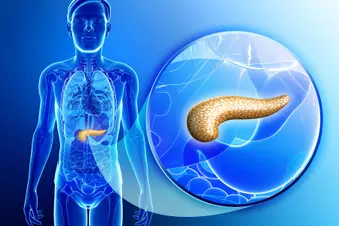
Exocrine pancreatic insufficiency (EPI) is a condition that happens when there's a problem with your pancreas, mainly with how well it helps you digest food.
Your pancreas makes enzymes that break down the fats, proteins, and starches you eat so your body can use them. If the organ can't do its job, you can have digestive and other problems, such as:
- Loss of appetite
- Diarrhea
- Weight loss
- Loose, pale, oily, foul-smelling stools
- Stomach pain
- Gas and bloating
- Bone pain
- Muscle cramps
- Swelling in your lower legs
- Skin that’s pale, bruises easily, or gets rashes
Without treatment, EPI can make you malnourished -- you won't get enough important vitamins and nutrients from your diet -- and it can lead to other serious conditions, such as thinning bones (osteoporosis) or the blood condition anemia.
You could have problems with walking and balance. You could also notice weakness or numbness in your hands and feet.
Who's at Risk?
EPI starts in people who have a damaged pancreas or a health condition that keeps the organ from working as it should. You might be at risk if you have:
- Surgery on your stomach, pancreas, or gallbladder
- A disorder that affects your pancreas, like cystic fibrosis, Shwachman-Diamond syndrome, or pancreatic cancer
- Stomach ulcers
- Celiac disease
If you're on a low-fat diet for a pancreas-related condition, you might have EPI but no symptoms.
Chronic Pancreatitis
This is the most common cause of EPI in adults. It happens when the pancreas has been inflamed for a long time. This can damage the organ and its enzymes. Heavy alcohol use and smoking cause chronic pancreatitis, but some types of it also run in families.
Cystic Fibrosis
In this genetic disorder, your body makes a thick, sticky mucus that can block the pancreas and keep it from releasing enzymes. If you have cystic fibrosis, your doctor might want to test you for EPI. It's especially important to get pancreas problems diagnosed in children because they need the right amount of nutrients and vitamins to grow.
Next Steps
If you think you might have EPI, talk to your doctor. They may send you to a doctor who treats stomach diseases, called a gastroenterologist. This specialist will test you and recommend treatments that can help.
Show Sources
SOURCES:
Medical University of South Carolina Digestive Disease Center: “Pancreatic Insufficiency.”
Pancreatic Cancer Action Network: “Pancreatic Enzymes.”
Lindkvist, B. World Journal of Gastroenterology, November 2013.
Leeds, J. Clinical Gastroenterology and Hepatology, May 2010.
American Diabetes Association.
The National Pancreas Foundation: “Exocrine Pancreatic Insufficiency,” “About the Pancreas.”
Cystic Fibrosis Foundation: “Nutrition: Pancreatic Enzyme Therapy in People with Cystic Fibrosis.”
Cleveland Clinic: “Night blindness.”
Medscape: “Current Challenges in Exocrine Pancreatic Insufficiency: A Multi-Perspective Discussion,” “Exocrine Pancreatic Insufficiency Clinical Presentation,” “Exocrine Pancreatic Insufficiency: Seen but Not Recognized?”
USDA: “Health Facts-Know Your Fats.”